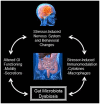Stress and the commensal microbiota: importance in parturition and infant neurodevelopment
- PMID: 25698977
- PMCID: PMC4313583
- DOI: 10.3389/fpsyt.2015.00005
Stress and the commensal microbiota: importance in parturition and infant neurodevelopment
Abstract
The body is colonized by an enormous array of microbes that are collectively called the microbiota. During quiescent periods, microbial communities within the gut are relatively resistant to change. However, several factors that disrupt homeostasis can also significantly change gut microbial community structure. One factor that has been shown to change the composition of the gut microbiota is exposure to psychological stressors. Studies demonstrate that the commensal microbiota are involved in stressor-induced immunomodulation, but other biological effects are not yet known. This review discusses emerging evidence that the microbiota can impact the brain and behavior and indicates that stressor-induced alterations in the composition of gut microbial communities contribute to stressor-induced behavioral changes. This review will also discuss the evidence that such effects are most evident early in life, where both stress and the microbiota have been linked to birth outcomes, such as prematurity, and neurodevelopment. When considered together, a paradigm emerges in which stressor-induced alterations in commensal microbial populations significantly impact parturition and infant neurodevelopment.
Keywords: anxiety; depression; microbiota; neurodevelopment; neuroimmune; prematurity; psychological stress.
Figures


References
Publication types
LinkOut - more resources
Full Text Sources
Other Literature Sources

